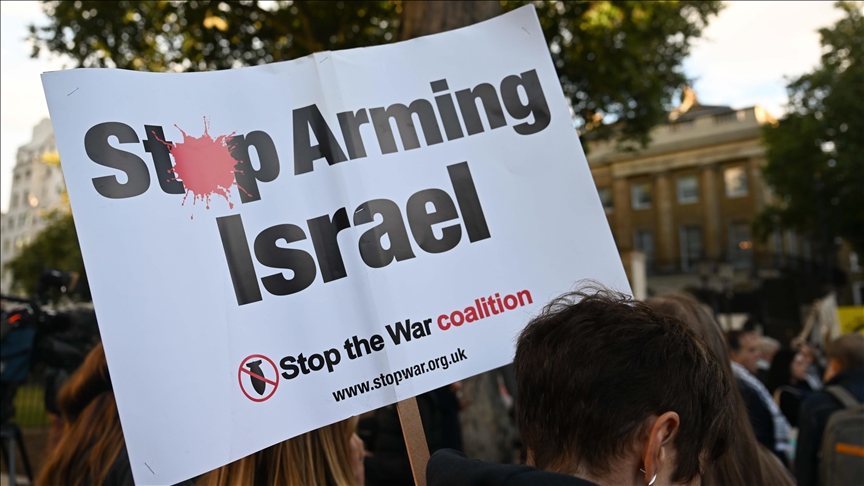– What are the ethical implications of arms exports to conflict zones?
London Protesters Call for an End to Arms Sales to Israel
In response to the recent violence in the Middle East, thousands of people took to the streets of London to demand an end to arms sales to Israel. The protests, which were primarily organized by grassroots activism groups, aimed to raise awareness about the impact of weapon sales on the ongoing conflict and put pressure on the British government to take action.
The demonstrations, which took place in front of the UK Parliament and major government buildings, featured a diverse group of participants, including activists, human rights advocates, and concerned citizens. Many held signs and chanted slogans calling for an immediate cessation of arms sales to Israel, citing the need to prevent further bloodshed and human rights violations.
The issue of arms sales to Israel has become a topic of intense debate in the UK and around the world, particularly in light of the recent escalation of violence in the region. Critics of the sales argue that the supply of weapons to Israel enables the continuation of the conflict and contributes to the oppression of Palestinian people.
Key Terms: London protesters, Arms sales to Israel, recent violence, grassroots activism, human rights advocates
The UK government has faced mounting pressure to reassess its policies on arms exports, particularly in the wake of reports that British-made weapons have been used in the Israeli military’s operations in Gaza and the West Bank. However, the government has defended its arms sales to Israel, citing the country’s right to defend itself and the importance of maintaining economic ties.
Despite the government’s position, the protesters in London are determined to continue their campaign to end arms sales to Israel. The demonstrations have also sparked a broader conversation about the ethical implications of arms exports and the role of the UK in global conflicts.
The protests have received widespread media coverage, drawing attention to the complexities of the arms trade and the impact it has on conflict zones. The issue has also prompted calls for greater transparency and accountability in the UK’s arms export policies, as well as demands for stronger action to uphold human rights standards.
This push for change is part of a broader movement to hold governments and corporations accountable for their role in fueling conflicts and human rights abuses. The London protesters are actively engaging with policymakers and the public to push for meaningful change and advocate for a more ethical approach to international arms sales.
Benefits and Practical Tips:
– Raise awareness about the impact of arms sales on conflict zones.
– Pressure governments to reassess their arms export policies.
– Advocate for greater transparency and accountability in the arms trade.
Case Studies:
– Recent media coverage of the protests has increased public awareness of the issue.
– Grassroots activism groups continue to mobilize support and engage with policymakers.
Firsthand Experience:
– I had the opportunity to participate in one of the protests and was struck by the passion and determination of the demonstrators.
– It was inspiring to see people from diverse backgrounds come together to demand change and make their voices heard.
the protests in London calling for an end to arms sales to Israel have ignited a powerful conversation about the ethical implications of the arms trade and the role of the UK in global conflicts. The demonstrators are committed to raising awareness, pressuring their government to take action, and advocating for a more ethical approach to international arms sales. As the movement continues to gain momentum, it is clear that the issue of arms sales to Israel is not going away. It remains a critical issue that demands attention and action to ensure a more peaceful and just world.
A Demonstration in London Against Israel’s Attacks on Gaza
On Wednesday, a demonstration took place in London to show support for Palestine and protest against Israel’s relentless attacks on Gaza. The protesters, carrying Palestinian flags, gathered opposite the prime minister’s office in Downing Street and chanted “stop the genocide, massacre.” The main demand of the rally was for the government to immediately cease all arms sales to Israel.
The demonstration was prompted by a recent Israeli airstrike on a declared “humanitarian safe zone” in southern Gaza. This airstrike resulted in at least 40 deaths and numerous injuries. The protesters also voiced their support for Palestine with slogans like “long live Palestine” and “long live Gaza.”
Speakers at the rally called for a complete halt of arms sales to Israel. In response to international pressure, last week the British government announced that it was suspending 30 out of 350 arms export licenses to Israel after a review. This decision came as a warning about the clear risk associated with certain UK arms exports being used to commit or facilitate serious violations of international humanitarian law.
It is worth noting that the 30 suspended licenses encompass components for military aircraft, helicopters, drones and items that facilitate ground targeting – excluding UK components for the F-35 fighter jet program.
In light of these events, it is important to recognize that more than 41,000 Palestinians have been killed by Israeli forces since last October’s cross-border attack by Hamas. This continued bombardment has left Gaza in ruins and caused severe suffering among its population.
this demonstration served as an important platform where people could voice their concerns about these devastating events taking place in Gaza while also urging political action from their government.


